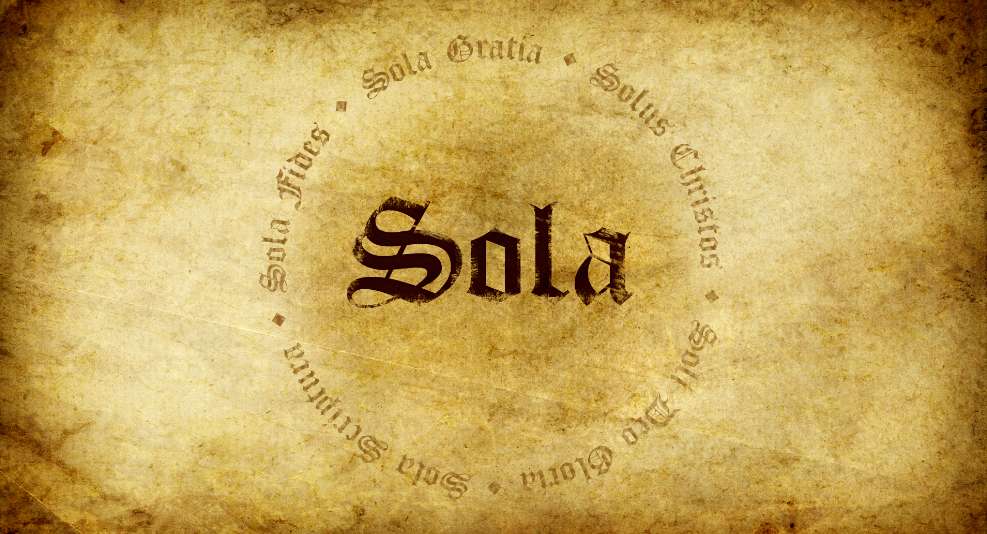
What are the Five Solas of the Reformation? How are they important? What was the Reformation? What does it mean to be “Reformed” anyway?
What the Five Solas are, and their importance to Christians, are clearly and concisely articulated in the GotQuestions article below. A short introduction to the Reformation can be found on the Ligonier Website (and others).
The question regarding what it means to be a Reformed Christian is complex. It has too many nuances to explore here, and I’m far from qualified to do so. But here are some observations.
For some people (though not all) being properly Reformed involves holding to Covenant Theology (Covenants of Grace, Redemption etc), a particular eschatology (amil-postmil), the church as the New Spiritual Israel, Calvinism, paedobaptism and particular confessions of faith (Westminster, Heidelberg etc).
So, someone like John MacArthur (and even Spurgeon) will be considered by some to be inconsistent in his Reformation because of his eschatology, view of Israel, and rejection of Covenant Theology and paedobaptism etc.
On the other hand MacArthur is placed in the Reformed Camp by some who aren’t Five-Point Calvinists and-or who strongly disagree with his Lordship Salvation stance. Often these are people who are wary of the term Reformed.
Whatever one thinks of MacArthur, Lordship Salvation and the Reformed Folk, the Five Solas are important and we ought to familiarize ourselves with them. I was delighted to see that essays on the Five Solas formed the basis of Part 2 of the dispensational work Formed From Reformation: How Dispensational Thought Advances the Reformed Legacy.
I largely agree with the premise of the book that “dispensational” thought is (or should be) a natural outcome of the Reformation. In the same rigorous manner that the Reformation applied Scripture and corrected Rome’s soteriology, it ought to have also corrected its eschatology, its view of ethnic Israel, and other areas.
But enough of that – The Reformation gave us the Five Solas, and here they are…
From GotQuestions
Question: “What are the five solas?”
Answer: The five solas are five Latin phrases popularized during the Protestant Reformation that emphasized the distinctions between the early Reformers and the Roman Catholic Church. The word sola is the Latin word for “only” and was used in relation to five key teachings that defined the biblical pleas of Protestants. They are:
- Sola scriptura: “Scripture alone”
- Sola fide: “faith alone”
- Sola gratia: “grace alone”
- Solo Christo: “Christ alone”
- Soli Deo gloria: “to the glory of God alone”
Each of these solas can be seen both as a corrective to the excesses of the Roman Catholic Church at the start of the Reformation and as a positive biblical declaration.
Sola scriptura emphasizes the Bible alone as the source of authority for Christians. By saying, “Scripture alone,” the Reformers rejected both the divine authority of the Roman Catholic Pope and confidence in sacred tradition. Only the Bible was “inspired by God” (2 Peter 1:20-21) and “God-breathed” (2 Timothy 3:16-17). Anything taught by the Pope or in tradition that contradicted the Bible was to be rejected. Sola scriptura also fueled the translation of the Bible into German, French, English, and other languages, and prompted Bible teaching in the common languages of the day, rather than in Latin.
Sola fide emphasizes salvation as a free gift. The Roman Catholic Church of the time emphasized the use of indulgences (donating money) to buy status with God. Good works, including baptism, were seen as required for salvation. Sola fide stated that salvation is a free gift to all who accept it by faith (John 3:16). Salvation is not based on human effort or good deeds (Ephesians 2:9).
Sola gratia emphasizes grace as the reason for our salvation. In other words, salvation comes from what God has done rather than what we do. Ephesians 2:8-9 teaches, “For by grace you have been saved through faith. And this is not your own doing; it is the gift of God, not a result of works, so that no one may boast.”
Solo Christo (sometimes listed as Solus Christus, “through Christ alone”) emphasizes the role of Jesus in salvation. The Roman Catholic tradition had placed church leaders such as priests in the role of intercessor between the laity and God. Reformers emphasized Jesus’ role as our “high priest” who intercedes on our behalf before the Father. Hebrews 4:15 teaches, “For we do not have a high priest who is unable to sympathize with our weaknesses, but one who in every respect has been tempted as we are, yet without sin.” Jesus is the One who offers access to God, not a human spiritual leader.
Soli Deo gloria emphasizes the glory of God as the goal of life. Rather than striving to please church leaders, keep a list of rules, or guard our own interests, our goal is to glorify the Lord. The idea of soli Deo gloria is found in 1 Corinthians 10:31: “So, whether you eat or drink, or whatever you do, do all to the glory of God.”
The five solas of the Protestant Reformation offered a strong corrective to the faulty practices and beliefs of the time, and they remain relevant today. We are called to focus on Scripture, accept salvation by grace through faith, magnify Christ, and live for God’s glory.
SOURCE: GotQuestions?org
